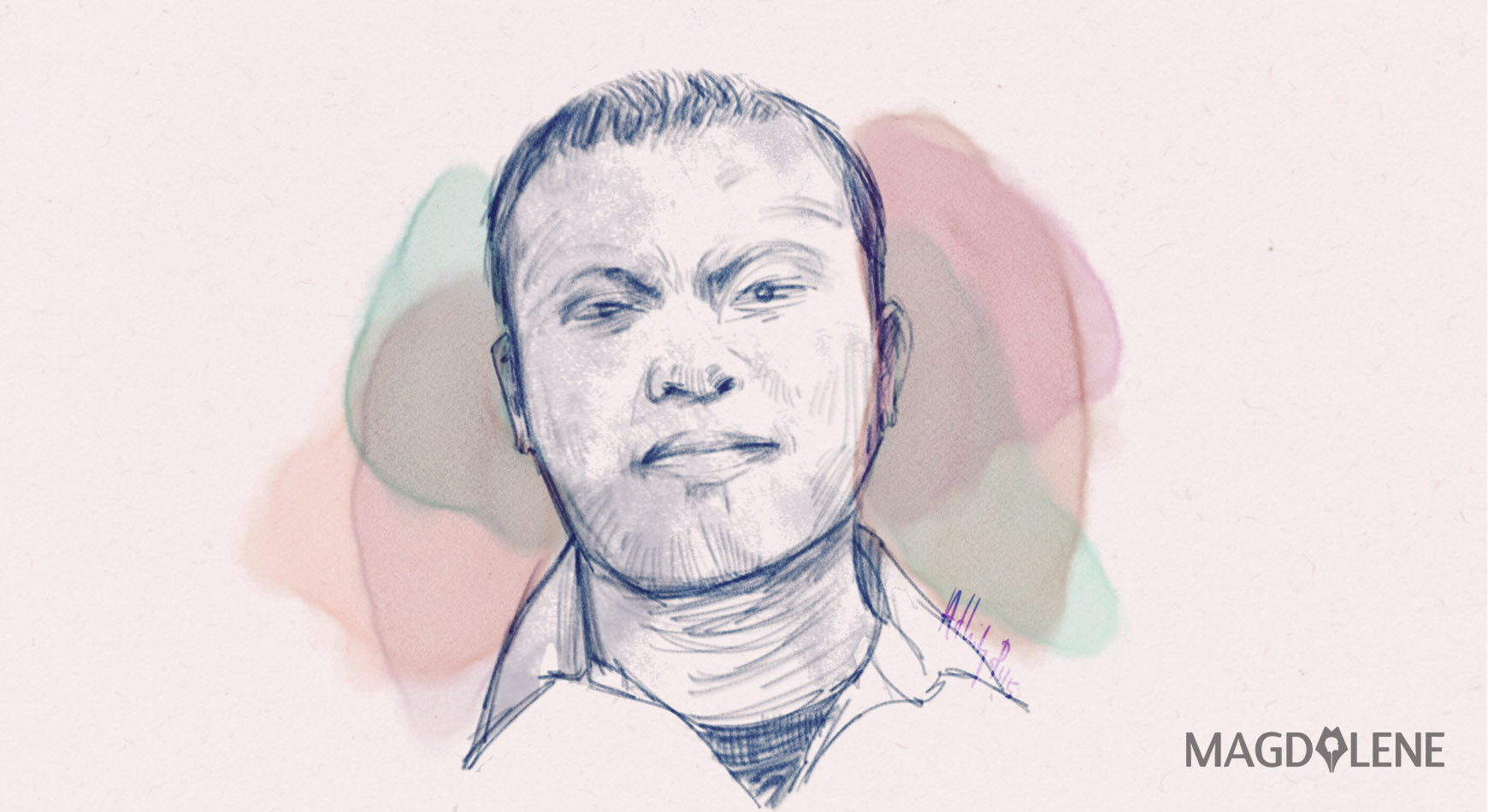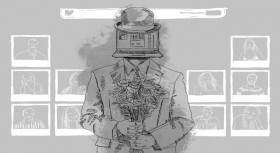Filmmaker Joko Anwar has never been one who shies away from admitting that he loves B-movies, particularly Indonesian martial arts and horror films that he grew up watching.
So when words got around that local producers were going to remake Jaka Sembung and Pengabdi Setan (Satan’s Slaves), he practically begged them to give him the projects.
“Those were among my favorite films when I was a kid. I didn’t know what constituted a good film back then, but they were engaging and well-made movies,” he said.
Unfortunately, the producers declined, saying that they had given the projects to other filmmakers. When Joko’s first TV series Halfworlds, premiered on HBO Asia on Nov. 29, however, it was as if the producers saw him in a different light.
The dark fantasy thriller Joko directed and co-wrote showcases the parallel world of bloodthirsty creatures from Indonesian mythology – like demit, genderuwo, kuntilanak, banaspati and palasit – wrapped in sleek and modern production value.
“When Halfworlds was out, some producers said, ‘Oh, I didn’t know you can also make movies for the masses’,” Joko said, scratching his head.
“It’s strange because my movies have been diverse, from comedy to thriller. But many seem to have a preconceived notion that I’m such a high brow and idealistic filmmaker.”
Except that he is not. Joko’s filmography spans different genres but none of them fall into the art-house films category. Joko’s debut film as director, Janji Joni (Joni’s Promise, 2005), is a feel-good teen flick, and he has written drama comedy Arisan! (2003) as well as goofball comedy Quickie Express (2007).
“I believe every filmmaker wants to make movies that appeal to the masses. I never want to have my films watched by segmented audience. It’s bullshit if somebody says, ‘I don’t care if it’s being watched by 10 people’,” said Joko, who just celebrated his 40th birthday early this month.
He suspected that the perception was based on personality, particularly on his commentaries on Twitter, which are often about politics and current affairs.
“The commentaries are just me playing my role as a functioning citizen,” said Joko, who never holds back in voicing his opinion to his 886,000 Twitter followers.
“Many people think I’m idealistic and high brow. But those who have worked with me always said that the filmmaking process was fun and collaborative, and that I’m not at all stubborn,” he added.
A testament to that is how the casts and crew were willing to work pro bono for Joko’s latest feature film, A Copy of My Mind, after the film failed to get enough financial backing.
Slated for theatrical release on Feb. 11, 2016, the film script had actually won the US$10,000 CJ Entertainment award at the Asian Project Market in Busan, South Korea, in 2014. That initial funding, though, was far from enough to get the film going.
Two friends then chipped in, each for Rp 50 million (US$3,600), making the total budget for the movie Rp 250 million. It is still a far cry from at least Rp 2.5 billion budget of a typical Indonesian film – some films even get Rp 50 billion to Rp 60 billion, regardless of the quality.
But the lack of funding didn’t deter Joko. He decided to make do with the tiny budget, making A Copy a guerilla filmmaking at its best. It was shot for eight days using handheld camera and Blackmagic Pocket Cinema Camera; and they had to shoot discreetly in several locations that were not secure such as inside the piracy haven of Glodok, West Jakarta, where even police and military officers don’t dare to come.
The two leading actors – Tara Basro and Chicco Jericko, both young stars in their own right, only received a tiny percentage of the film’s revenue, which is probably nothing compared to their regular fees.
It paid off. A Copy of My Mind had secured its slots in top film festivals in the world – Venice, Toronto and Busan, and it garnered Joko the Best Film Director award in the Indonesian Film Festival (FFI), along with Tara Basro for Best Actress and Khikmawan Santosa for Best Sound Director.
.jpg)
A Copy of My Country
“Each of my film crystalizes in a long period of time. Janji Joni’s idea and script came up in the 1990s, Kala (Dead Time) in around 2000, while A Copy emerged in 2012. All of the ideas and characters are based on those I’ve encountered in real life,” Joko said.
The idea for A Copy came, he said, as he was sick and tired seeing the political scene in the country that is plagued with corruption. Instead of making a full-blown political movie with a mission, Joko made it as a romance thriller with political setting.
At the center is a couple from the lower bracket of the economy – Sari (played by Tara), who works at a cheap facial parlor and Alek (Chicco), who makes Indonesian subtitles out of Google Translate for pirated DVDs.
They met after Sari demanded an exchange from a DVD shop because of bad subtitling. Her demand was unmet, and she ended up stealing another DVD, witnessed by Alek. But soon after, romance bloomed between the two as they found solace in each other.
As Sari found a job in a more upscale beauty salon, an unexpected turn of event occurred when she was assigned to do a facial for a client who is serving a prison sentence. The high profile convict stays in a special room that looks more like a hotel junior suite, and she can afford to get beauty treatment inside the prison (which is a true story).
Tempted by the convict’s DVDs collection, she steals one of them. What she thought was a monster flick, however, turns out to be a damning evidence of a bribery involving one of the current presidential candidates. Trouble ensues for Sari and Alek and they become the hunted.
This movie is by far the best one from Joko. It’s lyrical, poetic, authentic and sincere, showing without telling the fate of Indonesian people who are held hostage by kleptocratic rulers. It demonstrates without showy activism jargons how poor, hardworking people are always hit the hardest in this country.
What this movie lacks in budget, it more than makes up in characters, excellent script and detailed attention to the surroundings. Like the cliché of romcoms set in New York City – how the city becomes one of the characters – in A Copy, we get to see gritty side of Jakarta (although it is rather limited, perhaps due to the budget).
“I want this film to be a time capsule of Indonesia. It’s based loosely on the real situation when we were shooting the film. We even took advantage of the presidential campaign and inauguration rallies on the street, shooting during those rallies,” Joko said.
He’s glad that he and the movie won the FFI, as there was no promotional budget for the film. But he was anxious that he could no longer be more critical.
“It’s nice to not be recognized (by FFI), I can speak about anything. Now, I’m afraid that people would call me mentang-mentang (arrogant),” he said, laughing.
Salad Days
Joko and I go back a long way, when we were cub reporters at The Jakarta Post daily in 2000. Our love for pop culture and our penchant for deadpan and inappropriate jokes quickly made us close friends. Another thing that bound us together as friends was university-graduate poverty level.
We had just graduated from university a few months earlier and moved to Jakarta from Bandung for a job that felt like a revelation after feeling like we should’ve learned something else other than engineering in our respective universities (Joko at Bandung Institute of Technology and I at Parahyangan Catholic University).
As our barely-meeting-minimum-wage salary couldn’t cover an air conditioned kamar kost (rented room), we hung out at the office nearly every evening, smoking on the rooftop or writing whatever we wanted to write after we met the daily deadline. Sometimes we even slept beneath our desks, which were still more comfortable than our tiny, humid, mosquito-filled rooms.
Ahead of our payday, whoever still had some money left would share with the other to survive the rest of the month. Our sartorial collection was limited, and the most sophisticated gadget that we had were beepers the size of cigarette pack, and recording devices that were so outdated even then (Joko’s embarrassingly made loud noise whenever the tape runs out) that the rich kid in the office laughed at us.
But we both love writing, although I was more into journalistic piece while Joko always had a dream of writing screenplays and making movies. On those late nights at the newsroom, he would write movie reviews on the side and film scripts.
“Read this! I’m going make my own movies someday. And they’re going to be really good,” he said.
We would mock his cockiness, but whoever got to read the scripts had to admit that they were indeed good, even better than the local films we’ve seen at the cinema.
As he felt that journalism was not the right path to his dream of filmmaking, Joko quit after barely a year to work at a production house that creates soap operas, to the dismay of the editors who had a lot of hopes in him, because Joko was the whiz kid at the newsroom that excelled above his peers.
His stint at The Post, however, seemed nostalgic and memorable enough for Joko that traces of characters, names and places he encountered during the reporting days are scattered in his movies. The crime reporter in Kala (2007), the modest apartment in Fiksi (2008) and the crummy and packed rented rooms not unlike the ones we lived in, in A Copy of My Mind (2015) are just few examples.
Back in our reporting days, however, we hated covering politics although political discussions were unavoidable when you work in a newsroom. Joko used to shush us when we were talking about politics and current affairs, and asked if we could talk about something else.
But now he posted political commentaries on social media. What gives?
Joko always has the empathy and sensitivity toward social issues, as reflected in his films. But he was lured into politics, like many people, ahead and during the presidential election campaign that led to the most divisive general elections in the country.
He realized that having thousands of social media followers and impressive Klout number, he had quite the power to reach out to the masses.
“At that time, I thought I had to be involved and to play a bigger role in the campaign,” said Joko, who was among President Joko Widodo’s volunteers that supported his election campaign.
But now that people seem to be distracted by his persona on Twitter, he’s thinking of focusing more on his films on social media, saying that “your films are your children.”
“People perceive me based on my personality, not my works. I never hold anything back on Twitter, but now if people call me to ask about my opinion, I prefer to talk about films to anything else.”
He is now ready to shoot the next film, which is part of the trilogy of A Copy, a time capsule of Indonesia. A Copy of My Soul is planned to be shoot this year, as Joko’s production house, Lo-Fi, may secure another overseas project that could finance the his own project. The last of the trilogy is A Copy of My Heart.
“A Copy of My Mind is about young people, while A Copy of My Soul is about older generation, aging people. It’s set in a senior citizen house, where the residents are hired to be film extras as the management can no longer afford the operational cost. As for A Copy of My Heart, it will be the clash between young and older generation. Both of the films will also be based on the political and social setting at that time of the shooting,” he said.
Whenever his films are being released, Joko said he tries to not get overly excited, so he’d be ready for people’s response.
“It’s being done, whatever the response would be, so be it. It’s different when I’m about to start shooting a film. I would be very excited and get a natural high,” he said.

*Photos by Indra Leonardi and Lo-Fi Flicks








Comments